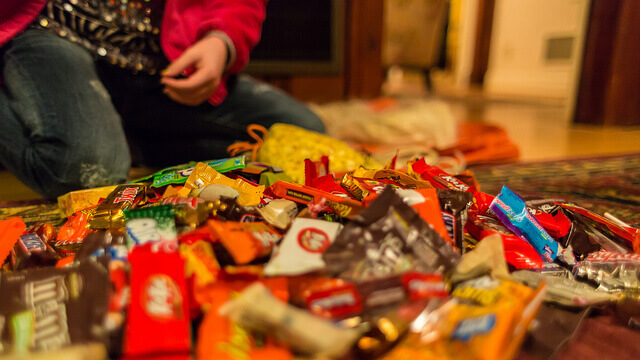Halloween is supposed to be spooky, but it can be an especially stressful night for the furry little monsters in your house. Follow these tips to keep the holiday fun—not frightening—for your family pets.
Stranger danger!
Visitors (in costume, no less!) are often scary and stressful for pets.

Photo Credit: Jenny on Flickr
Be sure to keep all family pets in a separate room during peak trick-or-treating hours. This can lower anxiety for both the animals and the kids visiting your home. You may also consider a sign for your front door asking all patrons to knock rather than use the doorbell.
Unsafe sweets
All Halloween goodies should be reserved for trick-or-treaters of the human variety. Dogs are sensitive to a chemical called theobromine found in chocolate. This compound is found in all types of chocolate, but dark and unsweetened baking chocolate is the most dangerous. Ingestion of chocolate can cause vomiting, excitement, urinary incontinence, tremors, heart arrhythmias and seizures. Many sugar-free candies and gums also contain xylitol, a sugar alcohol that tastes sweet but has no calories. For animals, xylitol can lead to a rapid drop in blood sugar. Symptoms include weakness, vomiting, seizures and liver dysfunction or failure.

Photo Credit: Patrick on Flickr
When returning from trick-or-treating, ask kids to keep their candy stashes in the kitchen, rather than in their rooms where pets can easily access them if left out. A cupboard or pantry is the best place to keep leftover Halloween candy as well.
Dangerous décor
Festive decorations may be half the fun of Halloween, but they can quickly turn frightening—or even fatal—if you have pets. While many seasonal plants, such as pumpkins and decorative corn are nontoxic, they can lead to GI upset in animals if eaten. Carved pumpkins can be particularly dangerous when lit, especially if you have curious kittens or puppies in the house. All wires and cords should also be kept out of pets’ reach. If chewed, these could cause severe cuts, burns and electric shock.
Crazy costumes
As irresistible as it is to play dress up with our pets, there are some hazards to keep in mind. First, make sure your pet’s costume is safe. This means that it should not constrict his/her movement, hearing or eyesight. It should also allow the pet to breathe, bark and meow normally. Make sure the costume fits properly and does not have small pieces that could easily be chewed off or choked on.

Your pet should be supervised at all times when wearing a costume. And remember, if he/she seems distressed, don’t force it.

